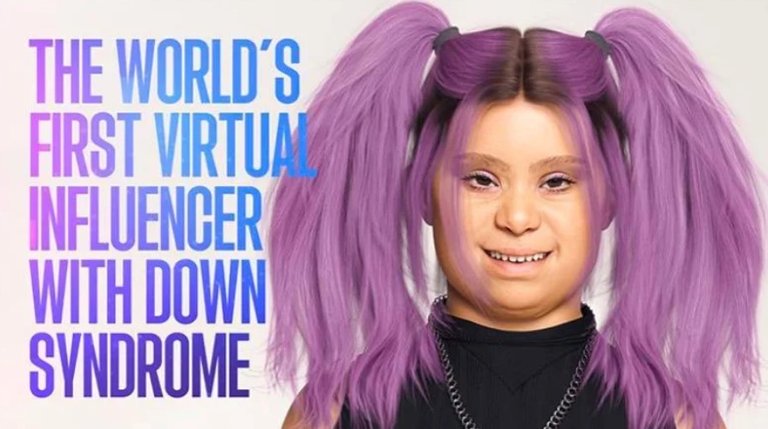虛擬網紅的重新塑造 / The Reshaping of Virtual Influencers

在競爭激烈的流行娛樂市場中,以AI技術打造的「虛擬偶像」在近年默默加入戰局與真人偶像大搶飯碗,「虛擬偶像」有效解決了近年來娛樂市場屢見不鮮的人設崩塌危機,不會爆出婚外情誹聞、惡質霸淩事件或是失言風波,並且永遠凍齡在最美麗或帥氣的時間,因而受到廣大追星族群的支持與品牌廠商的愛戴。
由韓國娛樂龍頭「SM娛樂」公司所打造的女團aespa就是由四名人類成員Karina、Giselle、Winter、Ningning,以及四名成員所對應的虛擬人物「æ」所組成偶像女團,主打「遇見另一個自我化身,體驗全新世界」的概念,分處於虛實兩地的成員既可以分開來進行演藝活動,也能穿越到虛擬空間(Kwangya)合體進行表演,aespa獨特的經營模式,在韓國樂壇具有劃時代意義,世界上,還有很多老新虛擬偶像,如初音未來、絆愛 Kizuna AI、Lil Miquela、洛天依、A-SOUL等,在各自擅長的領域各領風騷。
虛擬偶像似乎都擁有一幅精緻無瑕的臉龐,然而,世界上大多數的我們都是可能不完美的,有自己的弱點,或許那些不完美的,才是人生,一味追求完美,反而可能適得其反,由 Jesse Zhang 創造的抖音虛擬網紅阿喜(Angie),獨樹一格地以「不完美」的形象示人,阿嘉的皮膚有時會乾燥或泛紅,因為長痘痘,喜歡吃霜淇淋、會彈吉他,常常穿著簡單的白色T恤和運動短褲,據受訪者表示,她喜歡阿喜的原因是「因為她比很多真人還更真實」,Lil Miquela 則是位臉上長著雀斑,擁有小麥色皮膚的虛擬偶像,這些虛擬偶像都打破了我們對虛擬偶像的刻板印象,他們每個都展現自己的特色和真我,正是這樣的「不完美」,反而讓虛擬人更加真實和人性化。
Kami是首位患有唐氏綜合症(Down syndrome)的虛擬人,她是由唐氏綜合症 (簡稱唐氏症) 國際、創意機構 Forsman & Bodenfors 和全球數字建模機構 The Diigitals 使用超過 100 名患有唐氏症的女性的照片和視頻,通過AI把她們的面部編譯成一張圖片。然後透過 3D 建模軟體進行優化,從 Kami 的臉到她的聲音和性格,一切都是基於這些真實的患有唐氏症的女性,Kami的出生,象徵的是唐氏症不是缺陷,也不是錯誤,生下來並不需要被「修復」,比起同情,她們更需要平等的被尊重與接納,希望人們不要忽視生活中每一個「Kami」。
新一代的虛擬網紅,不會是無時無刻都表現得完美無瑕,他們需要有自己的觀點,包括能夠發聲,能夠參與更多社會議題,Z世代對品牌的態度可能是這種造成轉變的重要因素之一,因為多數人更喜歡會讓他們產生共鳴,和他們共享價值觀的品牌,據統計,美國 73% 的Z世代支持能夠理解他們想法的品牌,76%則追求可以接受各種身份和人生經驗的品牌,企業或組織在塑造他們的虛擬網紅時,需好好思考核心價值觀,並需讓人們產生共鳴。
In the fiercely competitive world of entertainment, AI-generated "virtual idols" have quietly entered the scene, challenging real-life idols for the spotlight. These "virtual idols" have effectively addressed the recurring crisis of public image breakdown that has plagued the entertainment industry in recent years. They don't get caught up in scandals, controversies, or aging, as they forever maintain their flawless beauty or handsome appearances. As a result, they've gained immense support from dedicated fan groups and the affection of brand sponsors.
One prime example is the K-pop girl group aespa, created by South Korea's entertainment giant, SM Entertainment. The group comprises four human members, Karina, Giselle, Winter, and Ningning, along with four virtual personas known as "æ." They emphasize the concept of "meeting your alter ego and experiencing a new world." These members, who exist in both the virtual and real worlds, can carry out entertainment activities separately or come together to perform in a virtual space called "Kwangya." aespa's unique management model has made waves in the Korean music industry, and there are many other virtual idols, both old and new, like Hatsune Miku, Kizuna AI, Lil Miquela, Luo Tianyi, A-SOUL, each excelling in their respective domains.
Virtual idols may seem to have flawless faces, but the reality is that most of us are imperfect with our own vulnerabilities. Perhaps it's these imperfections that make life real. Striving for perfection may ironically lead to the opposite. Take Angie, a TikTok virtual influencer created by Jesse Zhang, for instance. Angie boldly presents herself in an "imperfect" manner, with occasional dry or reddish skin and visible acne. She loves ice cream, plays the guitar, and often wears simple white T-shirts and sports shorts. Respondents say they appreciate Angie because "she's more real than many real people." Lil Miquela, with freckles and a wheatish skin tone, is another virtual idol who breaks the stereotype of perfection. These virtual idols showcase their individuality and true selves, and it's precisely their "imperfections" that make them appear more genuine and relatable.
Kami is the first virtual person with Down syndrome, created using photos and videos of over 100 women with Down syndrome by Down Syndrome International, creative agency Forsman & Bodenfors, and digital modeling agency The Diigitals. AI was used to compile their facial features into a single image, which was then optimized using 3D modeling software. Kami's appearance, voice, and personality are all based on these real women with Down syndrome. Kami's birth symbolizes that Down syndrome is not a defect or a mistake; those born with it don't need to be "fixed." Instead of pity, what they need is equal respect and acceptance. It's a reminder not to overlook every "Kami" in our lives.
The new generation of virtual influencers won't be constantly striving for flawless perfection. They need to have their own perspectives, including the ability to voice their opinions and engage in a broader range of social issues. The attitude of Generation Z towards brands might be one of the significant factors driving this shift. Most people prefer brands that resonate with them and share their values. According to statistics, 73% of Gen Z in the United States support brands that understand their thoughts, and 76% seek brands that embrace various identities and life experiences. When companies or organizations shape their virtual influencers, they need to carefully consider their core values and aim to create a sense of resonance with people.
有時會覺得, 越誇張越引人注目, 太正常反而沒人理

對啊,所以新聞媒體都報導些聳動或特別的事物,不過,凡事物極必反,做自己就好 😁
好多都是嘩眾取寵, 博流量而已
Yay! 🤗
Your content has been boosted with Ecency Points, by @diochen.
Use Ecency daily to boost your growth on platform!
Support Ecency
Vote for new Proposal
Delegate HP and earn more